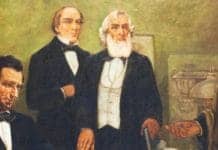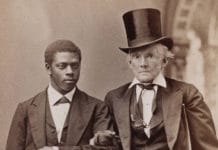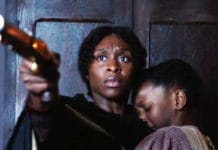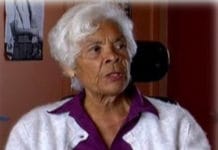by Wanda Sabir
Review I

What one notices immediately is Miss Ssippi (actress Nicole C. Julien) and her chorus, who protect and guide and shelter those who find refuge along her banks. The river is a huge presence and in Julien and her entourage, actresses Rebecca Frank, Halili Knox and Erica Richardson, Miss Ssippi is both the conscience and moral thermometer of the play.
When Damascus (actor Myers Clark) is shot and finds himself almost drowned in her waters, she saves him the way Yemanja lovingly eased the passage of so many Africans along the triangular slave trafficking route. Her blue garments and lyrical voice – singing, chanting, praising, even fussing – reminds me of the goddess of the sea, Yemanja, also a river in West Africa in Yorubaland.
The characters are mythical and epic in size. It’s amazing that more than one fit on the stage together, let alone the entire cast at the beginning when the song begins and at the conclusion of the journey when Miss Ssippi invites us to sing along.
The story is an American one: What happens when the enslaved and the slave master love one another? What happens when, for whatever reason, two children by one father, two women, are raised as one: twins? Reminds one of Shakespeare’s “Comedy of Errors” and to a certain extent “As You Like It,” as performed by the African American Shakespeare Company, cast in the antebellum South.
The metaphors are numerous, none more so than this Jesus (actor David Westley Skillman) character who of course moonwalks on the Mississippi because in this resurrection story it’s Vicksburg and he’s very much alive. He’s just grooving. Westley is also cast as “The Great Tree” whose limbs the KKK string Damascus from.
So there is this major battle, May 22, 1863, where the Union Army tries to take the Confederate stronghold. Vicksburg, Miss., is halfway between Memphis in the north and New Orleans to the south. It was an ideal strategy to cut the Confederacy in half and take control of the Mississippi River, which eventually happened but not without many losses on the Union side and the Confederacy surrender July 3 in the Battle of Gettysburg.
The families left behind in “Moonwalk,” Blanche Verse (actress Sarah Mitchell), half-sister of Free Girl (actress Erika A. McCrary), and Cadence Marie Verse, the girls’ mother (actress Jeanette Harrison), speak often of hunger and this indeed was key to the end of the war – starvation. However, in “Jesus Moonwalks,” Gardley is more concerned with relationships or the juxtaposition of relationships: What if a slave mistress adopts a Black child and raises her as her own? What if two defectors meet – one Confederate, the other Union – and they start to dance? What if the “House Negro” takes over the plantation? Why, if Jesus really can moonwalk?
Jesus doesn’t just moonwalk; Jesus talks … he saves a little girl who doesn’t know who she is; he intercedes or calms the waters when they threaten to drown her … he helps her remember her song.
With characters whose names sing like poetry and bring to mind ancient rites and the cycle of life, like seasons which come whether we want them, anticipate their arrival or await their departure on the river which alternately carries tales and people.

Blanche Verse – white verse or blank verse? Cadence Verse – cadence as in the rhythm. Brer Bit – Brer Rabbit, Elegua or the Trickster (actor Martin F. Grizzell Jr.) – speaks in riddles and is plotting to turn the white house black. Yankee Pot Roast and Jean Verse. Free Girl’s mother’s name is Poem. Damascus is biblical like Jesus and was the capital of the modern country Syria, a city known as the pearl of the East.
Then we have cross dressing ghosts. It’s bigger than “Cinderella.” Damascus as Demeter doesn’t just lose a slipper; if he slips, he loses his life. Like the biblical story where Jesus is crucified, Damascus also has three days to work his miracle, that is, to find his daughter “Poem” and give her her song (before his walk on the plank).
“Jesus Moonwalks” chronicles that journey and, like all trips, one has a map or plans but circumstances get in the way and one has to keep one’s focus yet stay open to change. This is how Damascus as the woman Demeter reaches his/her destination. This is how the playwright’s great grandfather freed himself from slavery traveling north from Louisiana dressed as a woman. Jefferson Davis wasn’t as lucky when he donned his wife’s hoop skirt after conspiring in Lincoln’s assassination. (There is a reward notice for Davis and five other co-conspirators in the program.)
A quilt is another character in Jesus Moonwalks – it represents the completion of the story when the pieces are finally joined and all the holes closed. There are questions, such as why did the white mistress raise this Black child as her own, once she knew the child was Black? Why did she hide her Black daughter by having her wear make-up to cover her dark skin? What happened to Poem; did she really die of a broken heart? How did the two girls, sisters, continue to live their lives as sisters in a land where Black and White were enemies, not friends, let alone acknowledged kin?
It is here that the story sounds like echoes of the playwright’s imaginary friend who saw Jesus moonwalk. In the San Francisco Bay Area in 2010, OK, biracial children do have mothers or fathers who are white, but this is not 2010; it’s 1861. While not quite Sally Hemings revisited, the Thomas Jefferson story comes to mind just because Jean Verse (actor David Sinaiko) says he is returning home because he missed Poem and wants to divorce his wife and live with his slave. He writes as much in a note that his daughter, not wife, reads.
Nothing changes between the two girls, although the Verse sister tries to keep Free Girl blind to her identity because she thinks once she knows she is Black and her mother is the woman Poem, things might change between them. It doesn’t when Demeter tells his granddaughter to wash off the powder and look at herself in the mirror, and Free Girl sings her song and remembers who she is and who her people are … which includes the Verse family, especially her sister.
The world the Verses, Free Girl, Brer Bit live in has crumbled by the end of the play. The white house is blackened, and what they once had all is gone except the quilt which Free wears around her shoulders.
Cuttingball Theater is at the Exit Theater on Taylor, 277 Taylor, in San Francisco, walking distance from Powell Street BART, across the street from Glide Memorial Church. For information, visit www.cuttingball.com.
Review II
“… And Jesus Moonwalks the Mississippi,” a new play by Marcus Gardley, directed by Amy Muller, currently in an extended run at Cuttingball Theatre, is what one might call a Sally Hemings San Francisco Bay Area story, except in this story the white slave mistress raises her husband’s child with slave as her own. The child’s name is Free Girl.
First seen about two or three years ago as a part of Bay Area Playwrights’ Festival, Marcus Gardley, wunderkind talent, a superb writer whose geographical landscape is Oakland, tells a story his grandmother told him. Jesus was set in the South in a Black church at a time when these houses of the Lord were going up in smoke. I was put in mind of an installation at the Yerba Buena Center for the Arts, where an artist used the charred remains of a church or maybe churches; this included a burned bible. The pieces were hung in such a way to invoke a building – the string transparent. I think I later saw this same work at the deYoung Museum.
I really liked the earlier work and between that and the current completed work, there was a draft I missed, so I was kind of surprised at “Moonwalks” complete revision. I don’t think the river was present in the play I saw, but I know the work one sees at BAPF is a work in progress so I know things change and Gardley is a writer whose work changes and shifts along its path to completion.
“Jesus Moonwalks” is poetic and rich and textured as one can expect from a Gardley work, his characters multidimensional and as perplexing as ever. I really like the river and I love Jesus. The other folks range from Damascus/Demeter, the father who is looking to find his daughter, Poem, to give her her song and instead finds his granddaughter, Free Girl, who knows the song but doesn’t know who she is, to the slave master, Jean Verse, who loves Free Girl’s mother. Then there is the mistress’s child, Blanche Verse, Free Girl’s half sister, and the mistress herself, Cadence Marie Verse, who some say killed Free Girl’s mother, Poem, some say not; and the trickster house servant, Brer Bit, and the Union soldier, Yankee Pot Roast.

I found out later that she didn’t know the child was her husband’s illegitimate child by a slave woman, though later she might have suspected, as the child favored her mother.
Actress Erika A. McCrary’s Free Girl isn’t encouraged to think too much about her brown skin, covered as it is with powder, or think too much about how different she and her sister Blanche look. She is white, period, and her sister, who is told they are twins, believes this as well, a belief played really convincingly by actress Sarah Mitchell. “Jesus Moonwalks” certainly calls to question the notion of race as illusion, color the biggest illusion of all.
OK, so while the kids and their mom are starving, the house Negro, Brer Bit (actor Martin F. Grizzell Jr.), is scheming on how to gain control of the mansion and paint the white house black. The husband has left the army, deserted and is returning home when he meets another deserter, from the Union side, and captures him and makes him his slave.
Bondage … I guess if one owns another human being, it’s nothing to enslave another. Damascus, Poem’s father, Free Girl’s grandfather, is saved from drowning by Miss Ssippi and then white men hang him, but Jesus or the spirit of the tree – maybe both – save him. Well, he dies but he is given three days as a woman, Demeter, to accomplish his task.
Demeter meets Miss Ssippi again and this time refuses her help. Even so the beneficence and unconditional love this powerful water spirit, Miss Ssippi or Yemeja, has for Black people and the role she plays in the deliverance of Black people from the hardships of slavery is evident. She cushions the falls of so many of our people.
Yes, at times the play is confusing even with the great program notes the dramaturg Nakissa Etemad shares. I don’t know if reading them in advance helps much. I think a tutorial might be required (smile).
The one thing one can be certain of is a father’s love for his daughter. Damascus/Demeter loves Poem so much he walks the length of the Mississippi and even defies death just so he can find her and make sure she has what she needs to save herself, and that is her history present in the song he leaves to her. Actor Myers Clark’s Damascus/Demeter cannot rest in peace until he finds his girl even if that means in his current form she might not recognize him. Damascus is now Demeter, a woman.
The analogy: going to hell and back is apropos here.
Spirit is clearly working in this Blackman’s life and those of his kin. It is the only thing saving them and by extension those they love. Free Girl loves Jesus, whom only she can see – Jesus with long locs and black skin.
Heard the expression, “God works in mysterious ways”? Well, in “Moonwalks” he really does.
The third aspect of this story is the sanitation of rape and its resulting progeny. It is not a case of mixed race or intentional miscegenation here. The master and his property cannot love one another … it is not possible logically even if on stage and in books it is. I am just not with all this white and black together in slavery transposed to the 21st century. When Amy Muller, the director, in her statement talks about her being the mother of two Black sons, I am distracted. OK, so what? She does a great job directing a play which sounds complicated here, yet it not so complicated on stage, which is no easy feat.
Her relationship to the material has nothing to do with the characters in the play in 1863 and 1865. Cadence Marie Verse is not happy that her husband has a child with their slave, when she allows herself to think about it. She stays drunk and angry and mean. She is a wildcard one can’t really trust. In the end, one still doesn’t know what to believe.
On stage and within the pages of a book one can create a world that lives in one’s fantasy, but the reality is not as pretty now, certainly not 200 years ago when one thinks about mixed race kids and their parents. More often than not, they were not claimed by their white fathers, certainly not adopted by white stepmothers.
Look at the insulting caricatures President Obama’s campaign and second year in office have met on the covers of major magazines and newspapers. And his white mother really is his biological mother and she didn’t hide his heritage behind make-up.
Marcus Gardley, known for his surrealism and magical realism, plays with such concepts as race, family, war, love, peace and justice in this play, yet unlike previous plays or landscapes where this tangible-meets-intangible worked, the lines between the harshness of the antebellum South at a time when so many people died because Black people were not seen in the same light as white people just don’t ring true. Where does the softness come from in a Cadence Marie Verse, who can raise a Black girl as her own child, yet kill her mother?
It is too simplistic, the ending – two children playing with a quilt, the pieces finally all fitted together.
Free Girl … is she really or is it a contingency plan?
“… And Jesus Moonwalks the Mississippi” by Marcus Gardley is up at Cuttingball Theater in residence at the EXIT on Taylor, 277 Taylor St., San Francisco, Friday-Saturday, April 23-24, at 8 p.m., and Sunday at 5 p.m.
Bay View Arts Editor Wanda Sabir can be reached at wsab1@aol.com. Visit her website at www.wandaspicks.com for an expanded version of Wanda’s Picks, her blog, photos and Wanda’s Picks Radio. Her shows are streamed live Wednesdays at 6-7 a.m. and Fridays at 8-10 a.m. and archived on the Afrikan Sistahs’ Media Network, . The first review of “Jesus Moonwalks” was written April 15 and the second on April 23.
Wanda’s Picks Radio for April 23 features an interview with the cast of “Jesus Moonwalks.”

 Store
Store












